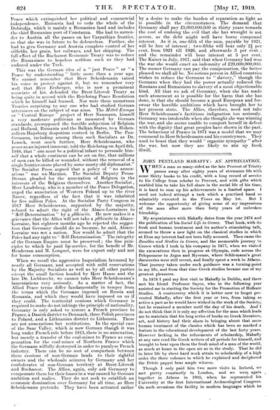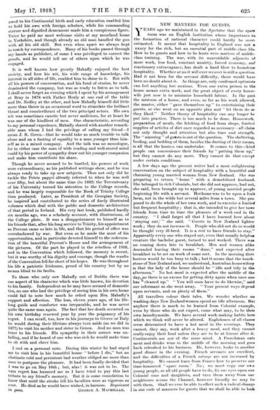JOHN PENTLAND MAHAFFY : Al APPRECIATION.
WHEN a man so many-sided as the late Provost of Trinity passes away after eighty years of strenuous life with some thirty books to his credit, with a long record of service to his College from scholar to Provost, and with gifts which enabled him to take his full share in the social life of his time, it is hard to sum up his achievements in a limited space. I need not indeed attempt a task which a practised hand so admirably executed in the Times on May 1st. But I welcome the opportunity of giving some of my impressions of the man after more than forty years of unbroken friendship.
My acquaintance with Malley dates from the year .1874 and the publication of his Social Life in Greece. That book, with its fresh and human treatment and its author's stimulating talk, seemed to throw a new light on the classical studies in which at Eton my interest had not been fully aroused. Then came the Rambles and Studies in Greece, and the memorable journey to Greece which I took in his company in 1877, when we visited the excavations then in 'progress at Olympia, rode across the Peloponnese to Argos and Mycenae, where Schliemann's great discoveries were still recent, and finally spent a week in Athena That journey taken under such guidance was a turning-point in my life, and from that time Greek studies became one of my greatest pleasures.
In 1878 I paid my first visit to Mahaffy in Dublin, and there met his friend Professor Sayce, who in the following year assisted me in starting the Society for the Promotion of Hellenic Studies. A controversy which it is better now to forget pre- vented Mahaffy, after the first year or two, from taking as active a part as he would have wished in the work of the Society. but he remained a member until the day of his death. And I do not think that it is only my affection for the man which leads me to maintain that his long series of books on Greek literature, art., and history had their share in bringing about that more human treatment of the classics which has been so marked a feature in the educational development of the last forty years. However lacking in the refinements of scholarship, Mahaffy at any rate read the Greek writers of all periods for himself, and brought to bear upon them the fresh mind of a man of the world, as much at home in the open air as in the study. That he did in later life by sheer hard work attain to scholarship of a high order the three volumes in which he explained and deciphered the Petrie papyri bear ample witness.
Though I only paid him two more visits in Ireland, we met pretty constantly in London, and we well again together in Athens in 1905, when he represented his University at the first International Archaeological Congress. On such occasions the facility in modern languages which he owed to his Continental birth and early education enabled him to hold hie own with foreign scholars, while his commanding stature and dignified demeanour made him a conspicuous figure. Twice he paid me most welcome visits at my moorland home in Yorkshire, and though already an old man handled the gun with all his old skill. But even when apart we always kept in touch by correspondence. Many of his books passed through my hands as publisher, of some I was privileged to correct the proofs, and he would tell me of others upon which he was engaged.
It is well known how greatly Mahaffy enjoyed the best society, and how his wit, his wide range of knowledge, his interest in all aides of life, enabled him to shine in it. But with all his powers of conversation, and his fund of stories, he never dominated the cpmpany, but was as ready to listen as to talk. I shall never forget an evening which I spent by his arrangement at Bray in 1878 with Father Healy at one end of the table and Dr. Nedley at the other, and how Mahaffy himself did little more than throw in an occasional word to stimulate the brilliant thrust and counterthrust of the two principal actors. His own wit was sometimes caustic but never malicious, for at heart he was one of the kindliest of men. One characteristic, according to my personal experience, Mahaffy shared with another remark- able man whom I had the privilege of calling my friend—I mean J. R. Green—that he would take as much trouble to talk alone and on a footing of equality to a man younger than him- self as in a mixed company. And the talk was no monologue, for in either case the man of wide reading and well-stored mind could by his power of sympathy draw out his younger companion and make him contribute his share.
Though he never seemed to be bustled, his powers of work were extraordinary, as his published writings show, and lie was always ready to take up new subjects. Thus not only did he tackle the Petrie papyri already referred to when be was well over fifty, but about the same time (in 1892) the Tercentenary of his University turned his attention to the College records, and he was largely responsible for the Book of Trinity College then produced. Later, as President of the Georgian Society, he inspirecrand contributed to the series of finely illustrated volumes which deal with the public and domestic architecture of that period in Ireland. His very last book, published hardly six months ago, was a scholarly account, with illustrations, of the College plate.. It was a disappointment to himself as to his friends that, after his long service to Trinity, his appointment as Provost came so late in life, and that his period of office was overshadowed by war. But even so he made the most of his opportunities, and in particular devoted himself to the redecora- tion of the beautiful Provost's House -and the arrangement of the pictures. Of the part he played in the rebellion of 1916, and in the Convention which followed, the memory is recent, but it was worthy of his dignity and courage, though the results of the Convention fell far short of his hopes. He was throughout his life a patriotic Irishman, proud of his country but by no means blind to its faults.
To those who only saw Mahaffy out of Dublin there was one aspect of his character which was little known, his devotion
• to his family. Independent as he may have seemed of domestic ties, no one who had the privilege of seeing him in his own home could fail to note how much he relied upon Mrs. Mahaffy's support and affection. The loss, eleven years ago, of his life- long guide and comforter was irreparable, and he was never quite the same man again. The fact that her death occurred on his own birthday renewed year by year the poignancy of his regret. I can recall, too, how in his journeys to Greece or Italy he would during their lifetime always turn aside (as we did in 18771 to visit his mother and sister in Genoa. And no man WAS truer to his Mende. His sympathy in their sorrow was un- failing, and if he heard of one who was sick he would make time to sit with and cheer him.
I end on a personal note. During this winter he had urged me to visit him in his beautiful house "before I die," but an obstinate cold and persistent bad weather obliged me more than once to postpone the pleasure. It had been finally decided that I was to go on May 16th; but, alas! it was not to be. The vain regret has haunted me as I have tried to pay this last tribute to my friend's memory. But it is some consolation to know that until the stroke fell his faculties were as vigorous as ever. He died as he would have wished, in harness. Requiescat ta pace. GEORGE A. Mecsmr-Lsw,



































 Previous page
Previous page